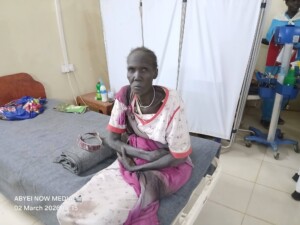Sudan sources: 11 demonstrators dead, protests grow
Civil disobedience actions and road blocks in protest against the military coup on October 25 continued for the fourth day yesterday. Reportedly 11 protesters were killed and 150 others were injured since Monday. Most of the bridges in Khartoum reopened. The internet in the country remained inaccessible. According to the African Centre for Justice and Peace Studies (ACJPS), two rebel leaders may be backing the coup.
 Young women carry logs to block the street (Social media)
Young women carry logs to block the street (Social media)
Civil disobedience actions and road blocks in protest against the military coup on October 25 continued for the fourth day yesterday. Reportedly 11 protesters were killed and 150 others were injured since Monday. Most of the bridges in Khartoum reopened. Flights to and from Khartoum International Airport were not resumed, while the internet in the country remained inaccessible. According to the African Centre for Justice and Peace Studies (ACJPS), two rebel leaders may be backing the coup.
Sources told Radio Dabanga from Khartoum that government institutions, schools and universities, as well as markets and many shops remained closed in the city.
Military forces continued to chase protesters in the neighbourhoods of the capital and remove barricades while the protesters re-closed the roads as soon as the forces had left. Demonstrations were dispersed with tear gas. In the evening, Khartoum witnessed a growing number of demonstrators in the neighbourhoods.
Almost all bridges linking Khartoum, Khartoum North, and Omdurman were re-opened yesterday. The White Nile Bridge, which links Omdurman with Khartoum, remained closed.
The authorities continued to close the internet services. Phone calls are reportedly possible but extremely difficult.
International airlines flying on Khartoum did not resume their flights, despite the announcement of the Civil Aviation Authority that flights were allowed again from Wednesday afternoon onward.
Victims
According to Nazim Saraj, activist and director of Hadreen Organisation, eight people were killed and 150 others were injured since the start of the demonstrations against the military coup on Monday.
Saraj said on his Facebook page on Wednesday that two protesters were “entirely paralysed” by bullets. A third one was being treated with bullets still in his chest. Seven others still needed surgical intervention.
The Resistance Committees in Khartoum North reported the death of a man and the injury of another when military forces opened fire on protesters in the El Shaabiya neighbourhood. Radio Dabanga was not able to confirm this news.
The Committees further said that Mohamed Abdelsalam, member of a Resistance Committee in Kober, died of his wounds sustained during a demonstration on Monday. A military force stormed the home of Abdelsalam in Kober yesterday, dispersed the mourners and chased a number of them in the streets.
The Sudan Doctors’ Central Committee reported yesterday evening that a man was shot dead and two others were seriously wounded when government forces fired live bullets at a group of demonstrators in Khartoum North (Khartoum Bahri) earlier that day.
Marches
Members of Resistance Committees active in the neighbourhoods of the Sudanese capital and other cities and towns in the country continued their calls for the October 30 Marches of the Millions against the military with marches and banners – defying the detention campaign of the armed forces against activists.
The External Action Committee of the Forces for Freedom and Change announced that 37 vigils in support of the government of Prime Minister Abdallah Hamdok will take place abroad, in conjunction with the planned marches in Sudan.

'This is us, said to have gone, said to have died, but here we are!' (Social media)
Coup
The military coup at dawn on Monday, October 25, may have come as a surprise to many, though tensions between the military and civilian components of the Sudanese government had risen to an all-time high in Sudan in the past weeks.
Following an aborted coup attempt on September 21, both parties exchanged accusations in the media. PM Abdallah Hamdok warned that Sudan was facing the "worst and most dangerous crisis" since the fall of the previous regime of Omar Al Bashir.
According to the Constitutional Document, signed by the Sudan Armed Forces and the Forces for Freedom and Change in August 2019, the military would pass the leadership of the Sovereignty Council to a civilian member in the coming month, as part of the country's transition to democracy. "Tackling corruption and implementing security sector reform were other agenda items that worried the generals," Sudan-watcher Alex de Waal commented on Wednesday.
In response to the military threats, hundreds of thousands of Sudanese took to the streets and joined the Marches of the Millions on October 21, in support of the government of Hamdok and the democratic transition towards civilian rule.
October also witnessed another protest, in the form of a sit-in near the Republican Palace in Khartoum, that called for the replacement of the current government by a government of technocrats. The protest was supported by Minni Minawi, leader of a Sudan Liberation Movement breakaway faction and now Governor of Darfur, and Jibril Ibrahim, head of the Justice and Equality Movement (JEM) who was appointed Minister of Finance following the October 2020 Juba Peace Agreement. Paramilitaries of the Rapid Support Forces were reportedly distributing water and food to the people at the sit-in.
The New York-based African Centre for Justice and Peace Studies (ACJPS) in a statement yesterday referred to the possible involvement of the rebel leaders in the coup. Allegedly there was deployment of the military from Darfur to Khartoum before the coup was carried out on Monday at dawn.
The ACJPS stated that Justice and Equality Movement (JEM) reportedly withdrew some of its forces from Darfur to Khartoum before 19 October, whilst the Sudan Liberation Movement faction under the leadership of Minni Minawi strengthened the presence of its forces in Khartoum on 24 October, a few hours before the coup.











 and then
and then